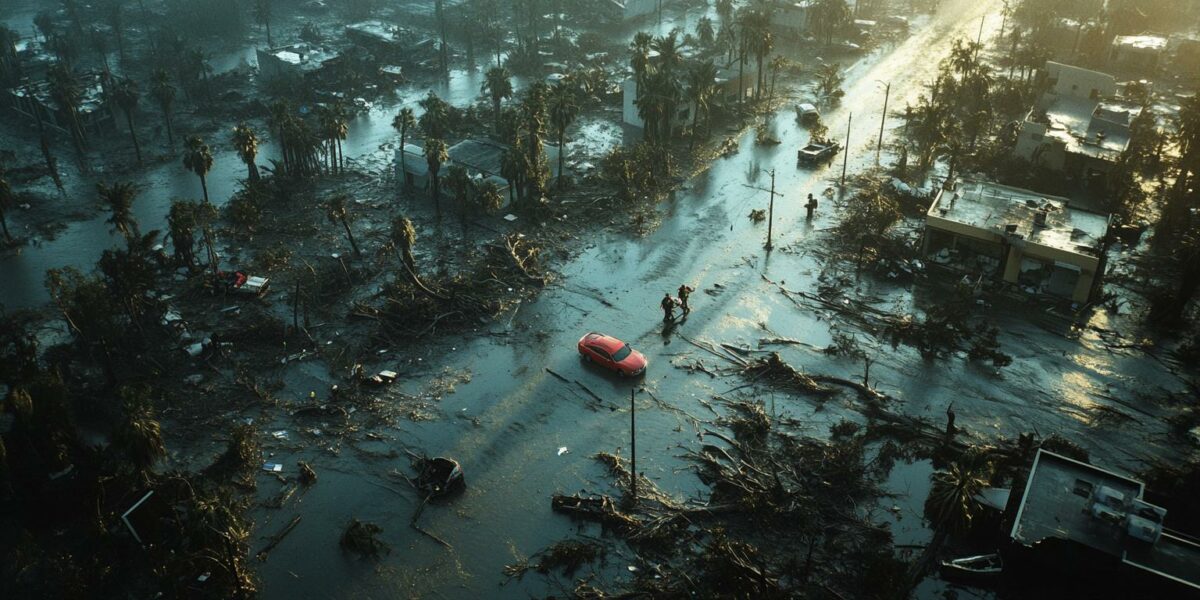The Spotlight on Climate Change
The recent havoc caused by Hurricane Helene has thrust climate change into the center of the presidential race. As candidates grapple with its severe implications, the topic has shifted from the periphery to a primary concern, highlighting the urgency and necessity for a robust response to these environmental challenges.
Vice President Kamala Harris, during her visit to Augusta, witnessed firsthand the extensive damage, while her Republican rival, former President Donald Trump, critiqued the federal response. This disaster, claiming over 200 lives, marks the deadliest storm since Hurricane Katrina, serving as a stark reminder of the realities of climate change.
President Joe Biden, observed the catastrophic aftermath in the Carolinas, Florida, and Georgia. Consistently tasked with addressing natural disasters, Biden remarked on the increasing intensity of storms, stating, “Nobody can deny the impact of the climate crisis any more.” His visits emphasize the administration’s commitment to tackling these profound environmental issues.
As climate change takes center stage, its prominence in debates is evident. The hurricane became a focal point in the vice presidential debate, where candidates discussed the broader implications of such disasters. It’s clear that the intersection of politics and climate impacts is becoming increasingly significant in shaping future policies.
Political Reactions and Debates
During a recent debate, candidates were queried about Hurricane Helene and its connection to climate change. Both political sides acknowledge the tragedy, but differing views on the crisis’s role in policy decisions emerged, showcasing the divide in approaches and solutions offered by each party.
Points highlighted in the debate included:
- The necessity of a strong federal response to natural disasters
- The acknowledgment of climate change’s impact on storm intensity
- Disagreements on the best path forward for addressing climate issues
Bob Henson, a leading meteorologist, pointed out how Helene has brought climate change into the campaign narrative. This catastrophe, affecting millions, aligns with established links between hurricanes and climate change, such as rapid intensification and extreme rainfall, emphasizing the need for informed policy changes.
The recent record-breaking rain in the Southeast, equating to an overwhelming amount of water, underscores the dire consequences of climate change. Ed Clark from the National Water Center highlighted the unprecedented precipitation levels, stressing the need for urgent attention to these growing threats.
Policies and Proposals
The candidates’ responses to climate-related policies varied, with Republican JD Vance advocating for increased domestic energy production. He argued that producing energy within the United States would ensure a cleaner environment, though critics question the environmental impact of such strategies.
Conversely, Democrat Tim Walz emphasized the connection between climate change and policy, pointing to the Inflation Reduction Act as a landmark investment in clean energy. Highlighting job creation and domestic energy advancements, Walz underscored the positive impacts of such investments on the American economy.
Walz countered claims that renewable energy policies benefit foreign economies. He noted that domestic production of natural gas and oil has reached unprecedented levels, supporting the argument that the U.S. is a leader in both fossil fuel and renewable energy production.
The candidates’ discourse reflects a broader national debate on balancing energy independence with environmental sustainability. Each side presents a vision for America’s energy future, shaping the narrative surrounding climate change and its impact on political decision-making.
A Shift in Environmental Policies
The ongoing discussion highlights a significant shift in national policy priorities. As climate change becomes an undeniable reality, political leaders are pressed to deliver solutions that address both environmental concerns and economic needs, marking a pivotal moment in the country’s approach to climate action.
Hurricane Helene, a catalyst for this shift, exemplifies the urgent need for comprehensive climate policies. The storm’s impact has prompted a reevaluation of existing strategies, reinforcing the importance of preparedness and adaptation in the face of increasingly severe weather events.
While some advocate for increased energy production, others focus on reducing reliance on fossil fuels. The debates underscore a growing recognition of the need for innovative solutions that balance economic growth with environmental stewardship.
As the presidential race continues, climate change remains a central issue, challenging candidates to propose effective policies that address the immediate and long-term consequences of environmental change. This evolving dialogue signifies a transformative period in national and global climate policies.



John_Serenity
Ironic how a hurricane is the only thing that could blow some sense into these debates!
willow4
Do these policies really benefit the average American or just big corporations?
audrey
LOL, I can already hear the debates turning into a weather forecast show! 😄
abigail
Thank you for highlighting the urgency of the climate crisis. We need more articles like this!
Lincoln
Why do I feel like the candidates are just using Hurricane Helene as a campaign prop?
Caroline
Honestly, the political blame game is getting old. How about some real solutions?
eastonzenith
Wow, over 200 lives lost… When will we learn to act before disaster strikes?
benjamin
Could someone explain how increased energy production is going to help the environment? Sounds contradictory!
luis_monolith
Great article! It’s about time climate change got the attention it deserves 😊
jeremiah
Is there any chance this debate will lead to actual change or just more political hot air?